Streetwear and Urban Fashion Trailblazer Tony Shellman | Black History Month
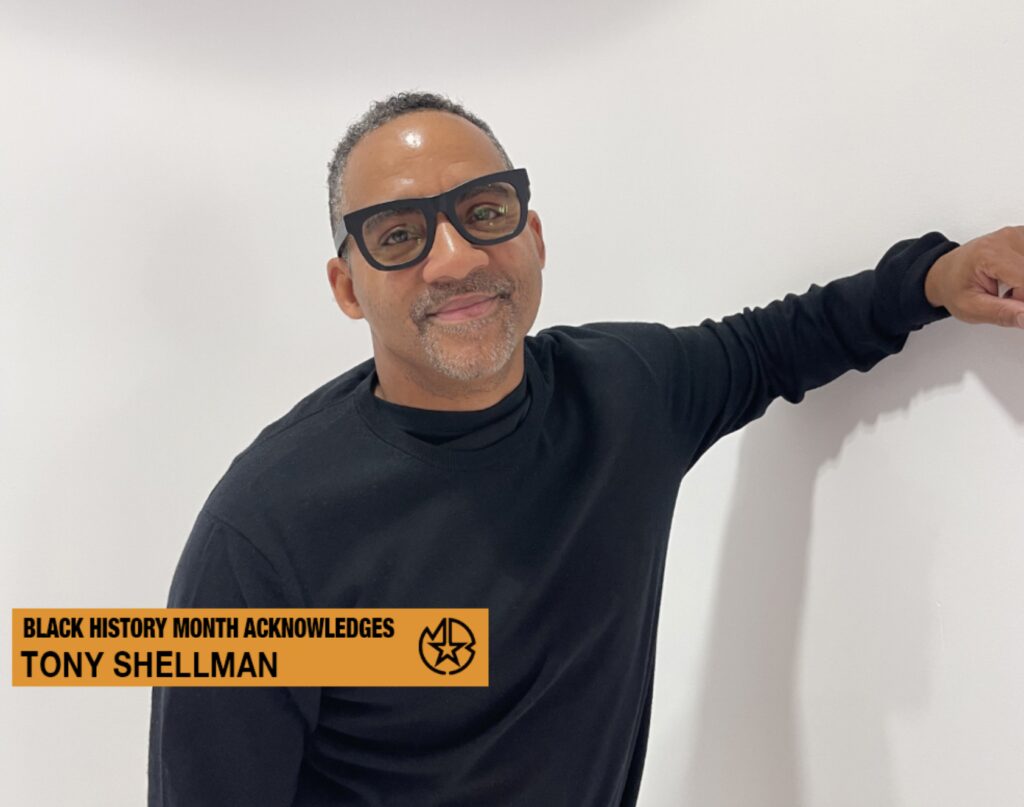
Celebrating the dynamic realm of fashion during Black History Month with the influential and brand extraordinaire Tony Shellman. Hailing from Seattle, Washington, Shellman has transformed humble beginnings into a legacy, shaping some of the most iconic urban fashion brands from the late 20th to the early 21st centuries. As the visionary behind Mecca U.S.A., Co-Founder of Enyce Clothing Company, and Parish Nation, Shellman’s imprint on streetwear culture is undeniable. In 1994, Tony Shellman, alongside Seattle compatriot Lando Felix, co-founded Mecca U.S.A., swiftly establishing it as a cornerstone in urban fashion. More than a clothing line, Mecca U.S.A. embodied a lifestyle and embraced the cultural movement of Hip Hop. Having honed his craft at Parsons School of Design in NY, Tony collaborated with April Walker of Walker Wear on her marketing team before venturing out on his own. Drawing from Walker’s expertise, he mastered product placement, resulting in legendary rappers like the Notorious B.I.G. donning Mecca U.S.A., catapulting sales into the millions. With distinctive designs featuring bold logos and graphics, Mecca U.S.A. resonated with the emerging hip-hop generation, solidifying its status as a must-have in urban fashion. Read the full article here Making A Brand
Authentic Message Power: Kanye’s Super Bowl Commercial Breaks the Mold
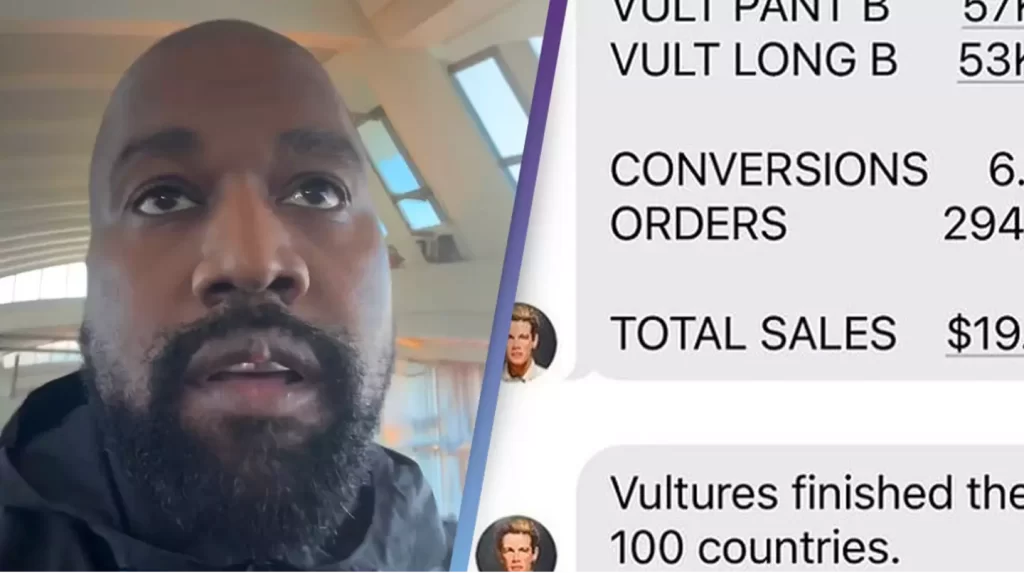
In a bold move during Super Bowl season, Kanye West revolutionized advertising by airing a minimalist ad shot entirely on a smartphone. With a production budget of $0, West’s team defied conventional wisdom and captured the essence of authentic messaging, showcasing the power of connecting with audiences on a personal level. The ad’s success highlights the immense potential entrepreneurs have in leveraging smartphone video and Digital Storytelling to reach their target audience effectively. In an era dominated by social media and digital platforms, authenticity reigns supreme. Here’s how entrepreneurs can harness the power of smartphone video to connect with potential customers: Cost-Efficiency: Unlike traditional advertising methods that require hefty budgets, smartphone videos offer a cost-effective alternative. Entrepreneurs can produce high-quality content without breaking the bank, redirecting funds towards other aspects of their business. Authentic Storytelling: The key to resonating with audiences lies in authentic storytelling. By sharing genuine experiences, values, and aspirations, entrepreneurs can forge meaningful connections with their target demographic. Kanye West’s ad exemplifies this principle, captivating viewers with its raw simplicity and sincerity. Accessibility: Smartphones have democratized the filmmaking process, allowing entrepreneurs to create and share content effortlessly. With the prevalence of social media platforms like Instagram, TikTok, YouTube, and LinkedIn, businesses can amplify their reach and engagement through strategic video marketing campaigns. However, amidst the allure of smartphone video lies the risk of poorly developed messaging that could harm a brand. While cost-effective production methods offer opportunities for creativity and innovation, entrepreneurs must exercise caution to avoid pitfalls: Lack of Clarity: Ambiguous or confusing messaging can dilute the impact of a video campaign, leaving viewers disengaged and uninspired. Entrepreneurs must ensure that their content conveys a clear and compelling narrative that resonates with their target audience. Inauthenticity: Authenticity cannot be manufactured or replicated artificially. Attempts to deceive or manipulate audiences through disingenuous messaging can irreparably damage a brand’s reputation and credibility. Entrepreneurs must prioritize honesty, transparency, and sincerity in their communications. Technical Quality: While smartphones offer accessibility and convenience, they also have limitations in terms of technical quality. Entrepreneurs must strive for excellence in production value, ensuring that their videos are visually appealing, well-edited, and professionally executed. Kanye West’s groundbreaking Super Bowl ad serves as a testament to the transformative power of authentic messaging and smartphone video production. By embracing authenticity, entrepreneurs can forge genuine connections with their audience, driving brand loyalty, and fostering long-term success in an increasingly competitive landscape. As they navigate the realm of digital marketing, entrepreneurs must remain vigilant in upholding the principles of integrity, creativity, and authenticity in their messaging and content strategy.
Moor’s Brewing Success and Pioneering the Path as a Black-Owned Brewery
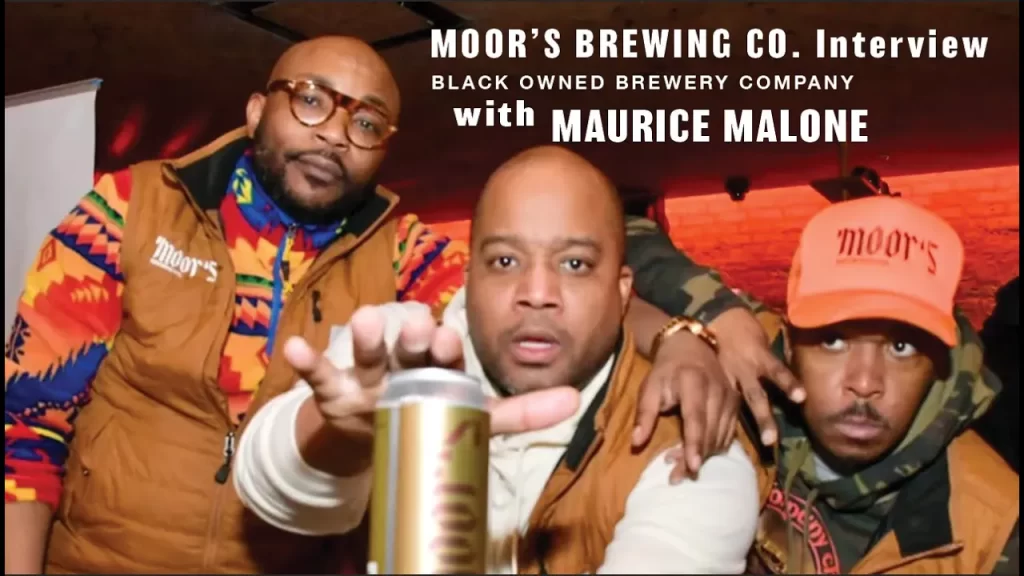
In the ever-evolving landscape of the craft beer industry, where innovation flows as freely as the brews themselves, a captivating story awaits our attention—one that revolves around Moor’s Brewing Co., a remarkable black-owned brewery that’s sending ripples through the craft beer world. Recently, our very own Maurice Malone, renowned fashion designer and beer aficionado, had the pleasure of sitting down with Jahmal Johnson, the visionary behind Moor’s Brewing Co. Together, they delved into Jahmal’s journey, the challenges he’s faced as one of the brewery owners, and the crucial role of representation and culture-forward marketing in this dynamic industry. As the craft beer movement continues to gain momentum, the importance of diversity and inclusion becomes increasingly evident. Moor’s Brewing Co. stands as a shining example, breaking down barriers and injecting a fresh perspective into the brewing scene. Jahmal Johnson, a passionate beer enthusiast with a dream, founded Moor’s Brewing Co. with the intention of bringing exceptional craft beer to a broader audience. In his candid conversation with Maurice Malone, Jahmal opens up about the inspiration behind Moor’s Brewing Co. He shares his deep love for beer and the burning desire to create a brand that not only crafts exceptional brews but also reflects the rich tapestry of black history and culture. Starting a brewery, much like any entrepreneurial venture, comes with its share of challenges. Jahmal Johnson doesn’t shy away from discussing the hurdles he’s faced as one of the brewery owners in an industry predominantly dominated by others. From securing a brewery partner to navigating the labyrinth of brewing regulations, Moor’s Brewing Co. has encountered obstacles that resonate with many aspiring entrepreneurs. But the story of Moor’s Brewing Co. isn’t just about overcoming challenges; it’s about celebrating triumphs. Jahmal shares the sheer joy of witnessing their vision come to life, from brewing that very first batch of beer to gaining recognition for Moor’s unique and flavor-packed offerings. As Maurice Malone continues to dig deeper into the conversation, the significance of representation in the brewing industry takes center stage. Jahmal Johnson underlines the importance of creating an inclusive space where everyone feels at home, both as consumers and within the brewing community. Moor’s Brewing Co. is on a mission to drive change by encouraging diversity and fostering an environment where individuals from all walks of life can pursue their passion for brewing. Jahmal also delves into the concept of “culture-forward branding” and how African-American (and Hispanic) brands often lack representation in the craft beer industry. He highlights the vital need to craft messaging that resonates with these cultures while highlighting affordability and value, or the unique cultural factors that set their product apart from the rest. Moor’s Brewing Co. isn’t just a brewery; it’s a vibrant community hub. Jahmal Johnson stresses the importance of community engagement, revealing how Moor’s actively participates in events, collaborates with local artists, and supports meaningful social causes. The conversation also touches on Moor’s future aspirations, including exciting plans for expansion within the craft beer industry, new beer releases, and a continued commitment to promoting diversity. The interview between Maurice Malone and Jahmal Johnson offers a captivating glimpse into the inspiring journey of Moor’s Brewing Co. It’s a story that goes beyond just beer—it’s about breaking down barriers, shattering stereotypes, and ensuring that there’s room for diverse voices in the world of craft brewing. As Moor’s Brewing Co. continues to make its mark, it serves as an inspiring beacon for budding brewers and a reminder that the craft beer community is at its best when everyone has a seat at the table.
A La Fresca x Maurice Malone: Pioneering Film Production Mentorship in NYC
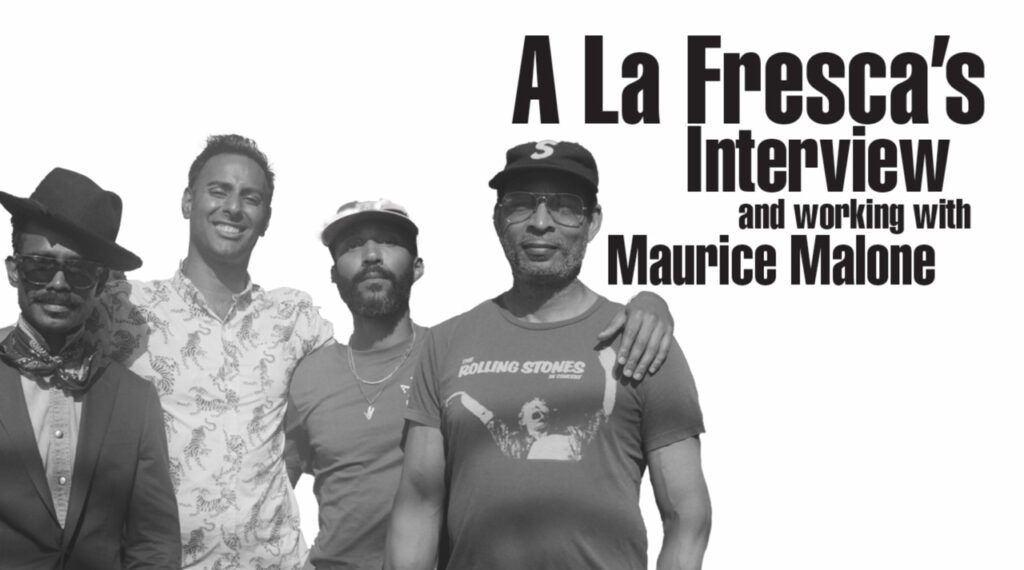
In the bustling urban landscape of New York City, A La Fresca, a unique video and film production company, is making a significant impact. Founded by Vinny Anand and Ron Austin Jr., this company has embarked on a mission to transform the lives of inner-city kids through the art of storytelling and film, specifically in producing commercials for high-end clients. Among their standout projects is a collaboration with celebrated fashion designer Maurice Malone. This endeavor is not just about showcasing Malone’s creative prowess but also about reflecting A La Fresca’s commitment to elevating diverse voices in filmmaking and digital storytelling. From the outset, A La Fresca made a conscious decision to involve youth from the inner city in every stage of the project. Recognizing the untapped potential within these communities, the company aims to break down barriers and provide a platform for aspiring filmmakers and creators. The company strategically involved inner-city youth in all aspects of this project, tapping into the potential of these communities. The aim was to dismantle barriers and offer a platform for budding filmmakers and creators. The result? A short story, available on A La Fresca’s YouTube channel, serves as both a tribute to Malone’s fashion legacy and a coming-of-age journey for the young crew involved. Under A La Fresca’s mentorship, these novices gained practical skills in cinematography, production, and storytelling, contributing to a project that seamlessly wove together the expertise of seasoned professionals with new, vibrant perspectives. Beyond the film set, A La Fresca opened networking doors for these youths, connecting them with industry figures and offering them a glimpse into a world that might have previously seemed out of reach. The collaboration with Maurice Malone, a renowned black designer, was particularly inspiring for the inner-city kids, fueling their passion for creativity and the realm of possibilities. Ultimately, this project transcended its initial purpose, morphing into a symbol of empowerment and a voice for the often unheard. A La Fresca’s partnership with Maurice Malone stands as a testament to the limitless potential that mentorship and opportunity can unlock for the next generation of creative minds.
Daymond John’s Black Entrepreneur Day at the Apollo Theatre: Celebrating Innovation and Empowerment
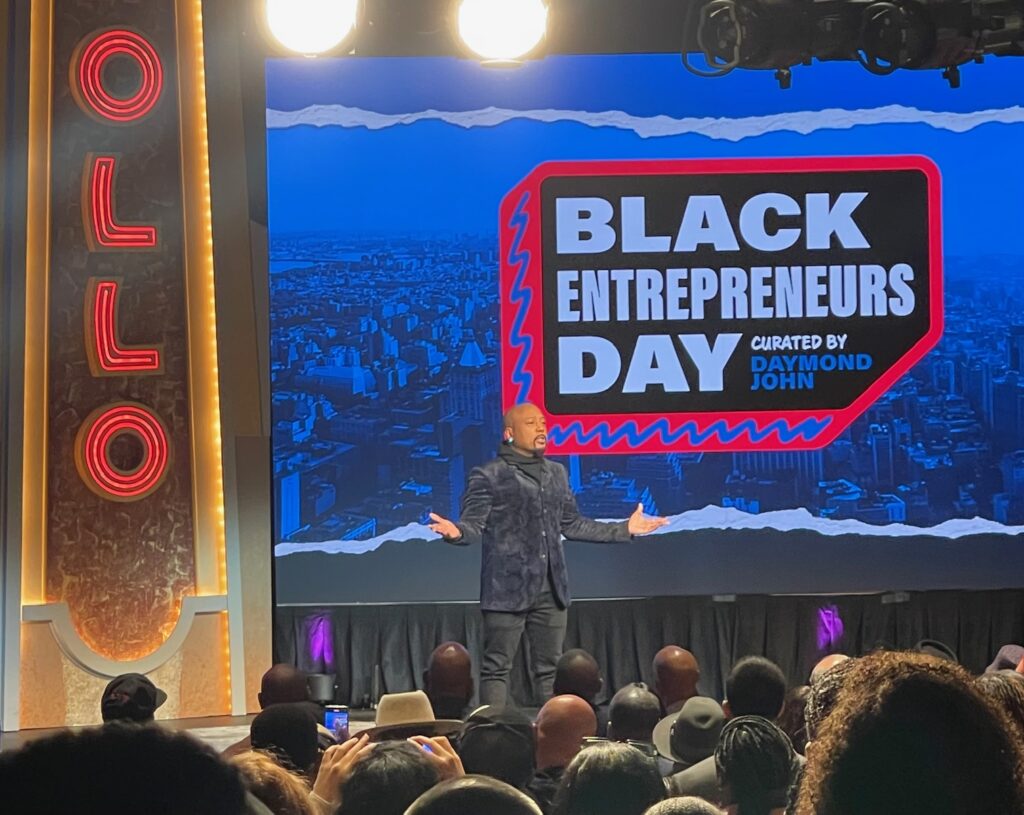
Harlem’s Apollo Theatre, New York’s premier stage for African-American excellence, recently hosted an electrifying evening. On October 21, it morphed into a beacon of encouragement, ingenuity, and empowerment during the live recording of Daymond John’s Black Entrepreneur Day. For those familiar with the business world’s giants, Daymond John is more than just a “Shark” from the beloved TV series Shark Tank. His commitment to bolstering the entrepreneurial spirit within the black community is unwavering, with Black Entrepreneur Day standing as a testament to his dedication. John, the renowned entrepreneur, investor, and TV star is no stranger to the world of business and entrepreneurship. As a fashion pioneer who founded the iconic clothing brand FUBU, Daymond John has made a name for himself as a successful Streetwear fashion entrepreneur, business developer and investor. FUBU rose to popularity as a “Hip Hop Fashion” or Streetwear Brand at the same time as Maurice Malone’s “Maurice Malone Designs”. Tony Shellman’s “Mecca” and “Enyce” helped changed the face of the fashion industry. New York City’s Mayor Eric Adams, a surprise guest at the event, presented Daymond with a Proclamation from the city of New York City for his contribution to the Hip Hop history. Black Entrepreneur Day is the brainchild of Daymond John, designed to provide a platform for black entrepreneurs to share their stories, connect with major investors, and access the resources they need to succeed. One of the most remarkable aspects of Black Entrepreneur Day was John’s emphasis on spotlighting Black talent and the importance of mentorship. Daymond stressed without having mentors throughout his journey his success would not had been possible. He shares Making A Brand’s goals in providing mentoring opportunities to new entrepreneurs and providing opportunities for personal mentorship and lessons from our partners Maurice Malone and Tony Shellman. The annual event held at the Apollo Theatre was a star-studded affair, bringing together a diverse group of entrepreneurs, investors, and influencers. Daymond John’s commitment to Diversity, Equity, and Inclusion (DEI) extends beyond the boundaries of his annual Black Entrepreneur Day event. With the financial support from JP Morgan Chase from the very beginning and other companies like META, The General, and Shopify have joined as sponsors making this event possible. John has been an outspoken advocate for major brands to embrace DEI and actively support Black businesses. Recognizing the untapped potential and innovation within the Black entrepreneurial community, John encourages major brands to not just make token gestures but to genuinely commit to partnering with, investing in, and promoting Black-owned businesses. His push serves as a call to action for corporations to be more than just allies in the DEI movement but to become proactive advocates for Black entrepreneurship, ultimately fostering a more equitable and thriving business landscape. Through his efforts, Daymond John is helping to reshape the narrative of economic empowerment and inclusion for Black entrepreneurs on a larger scale. The exclusive preview of the “Live Streamed” event featured a lineup of inspiring keynote speakers who shared their journeys, insights, and strategies for success. From John himself to luminaries like Anthony Anderson, Cedric The Entertainer, Shaquille O’Neal, Whoppi Goldberg and a host of other Black celebrities at the Apollo Theatre stage was graced by individuals who have not only achieved great success but have also paved the way for countless others. The panel discussions covered a range of topics, from starting a business with limited resources to leveraging technology and innovation to making a brand. These panelist not only provided valuable information but also foster a sense of community among attendees. Networking opportunities abound, enabling like-minded individuals to connect, collaborate, and support one another in their creative entrepreneurial journeys. Daymond John’s Black Entrepreneur Day at the Apollo Theatre is more than just a one-day celebration. It is a powerful movement that seeks to uplift and empower the Black entrepreneurial community, helping individuals turn their dreams into reality and hold companies accountable to supporting Black entrepreneurs through economic inclusion. This event is a testament to the resilience, creativity, and talent within the Black community, showcasing that the sky is not the limit but merely the beginning for Black entrepreneurs. As Daymond John continues to champion this cause, Black Entrepreneur Day stands as a symbol of hope and opportunity for generations of Black entrepreneurs to come.
God Said Give Em Drum Machines Screening: Exploring Detroit Music History with Dan Charnas
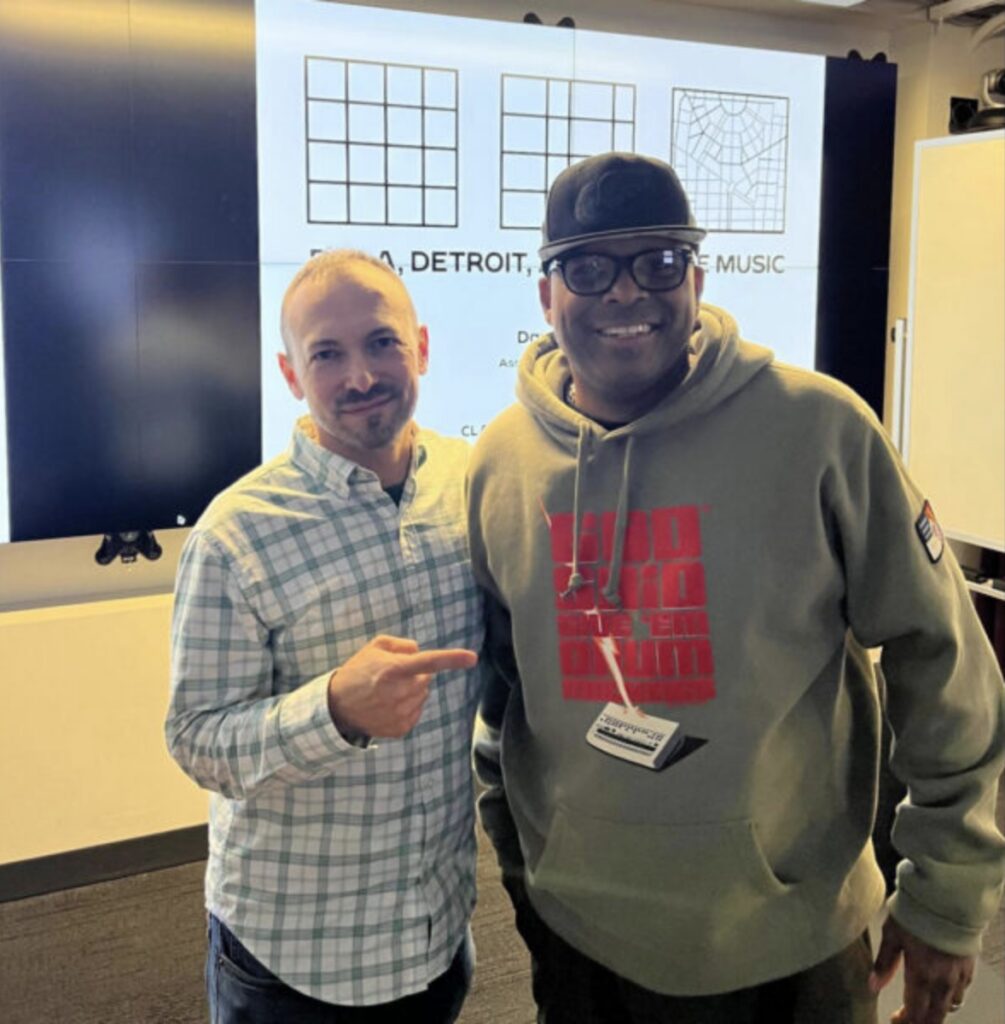
Dan Charnas invited David Grandison Jr. to screen a film he produced called “God Said Give ‘Em Drum Machines” for his students at The Clive Davis Institute. The course the screening was associated with is called “Dilla Detroit and Machine Music” that was created by Professor Dan Charnas. The students he spoke to were a interdisciplinary group of both aspiring musicians and students studying the business side of the music industry. The students enjoyed the film and engaged with David and Dan in a powerful discussion on Detroit’s unique electronic music culture after the screening. In this Q&A discussion, we drew parallels between factors that influenced the development of hip-hop and Techno. One important parallel was that both art forms were created by Detroit teens who embraced drum machine and synthesizer programming. Both Techno’s creators and legendary hip hop artists like Dilla’s mastered drum machine programming in their teens. We also discussed how robots took the jobs of the parents of Detroit teens causing Detroit’s economic upheaval while teens embraced robotic-sounding music and taught themselves how to program drum machines and sequencers seemingly to avoid the same kind of robotic replacement. In our discussion, we discussed parallels between these art forms that both employed synthesizers, drum machines, and digital tools like the Roland TR808 and other drum machines in similar groundbreaking ways. We also discussed the teen party clubs and DJ crews that fed the thriving dance-music-obsessed party scene in Detroit. The students shared numerous insights about Detroit Techno, Hip-hop and electronic music that they learned from the film. As in most screenings, more than half of the students in the screening did not know that Techno’s origins can be traced to teens in Detroit in the 80’s before they saw the film. His film speaks to numerous factors that influenced Dilla’s unique style of hip hop, from radio DJs like “The Electrifying Mojo” who introduced the first techno tracks to Detroit in the 80s DJs like The Wizard (Jeff Mills), who mashed up Techno tracks and pitched up hip-hop and later, into the 90s, by DJ’s like Derrick May who’s afterschool “MayDay Mix” and weekend late-night party mix shows like the “TP in The DMZ” mix show by Terrence Parker. Dilla was influenced to utilize and master drum machines sequencers and other types of electronic instruments by this exposure among other factors as teen. In Detroit collaborations go deep and many of the artists in J Dilla’s circle are known for their work in House, Techno and Hip-hop; for example; Amp Fiddler, who mentored him and taught him to program the MPC 3000 played with George Clinton in Parliament. J Dilla recruited Dez Andrez (DJ Dez) the DJ for his group Slum Village.Dez is the son of Humberto ‘Nengue’ Hernandez, a world renown percussionist. Dez builds strong bridges between house, and Hip-Hop. Another artist in his circle, Wajeed (Platinum Pied Pipers) who’s label has released multiple Dilla Tracks, crosses the landscape between Techno and House spreading Dilla’s musical influence. Then we have artist/designers like Maurice Malone (link name to maurice Malone’s mentor page) who created the Hip Hop Shop where J Dilla and his group Slum Village along with artist like Eminem, Proof and many more, honed their lyrical skills in cyphers and MC battles. Detroit musicians have always been innovative and have never been constrained by the artificial boundaries of genre. Dan Charnas’s dedication to preserving the legacy of Detroit artists like J Dilla and his ability to convey the essence of their work make him an invaluable asset to the world of music education. Through this course, he continues to inspire a new generation of musicians to explore the uncharted territories of music, time, and creativity, just as Dilla did during his too-brief but profoundly influential career. I count Dan as a friend and fellow journalist. We have been on our musical journeys to document Detroit musical history in parallel over the past few years, so we have shared information and Dan has invited me to speak to students in his course on J Dilla several times. Dan personally introduced me to J Dilla’s mother, Ma Dukes one time when she visited NYC he also credited me in his seminal book “Dilla Time” on the prolific and ground breaking producer J Dilla. David Grandison Jr is an award-winning Filmmaker, Instructional Technologist, and Making A Brand Co-Founder/Mentor. He created the Music Origins Project and our Digital Storytelling Course (link course name to digital storytelling course) out of a need to document and share the historical cultural origins of unique art and musical art forms. He is on a mission to help people learn to document their own cultural stories via film, 360-degree video, short stories and even in social media. He mentors filmmakers and teaches people around the world to follow his path of creating media that documents the cultural origins of musical art forms around the world on his sites the Music Origins Project (link to MusicOrigins.org) and Making A Brand. Contact us if you want to learn more about filmmaking, Digital Storytelling and mentoring with David.
Celebrating Emerging Cinematic Talent: Ghetto Film School’s End of Summer Event
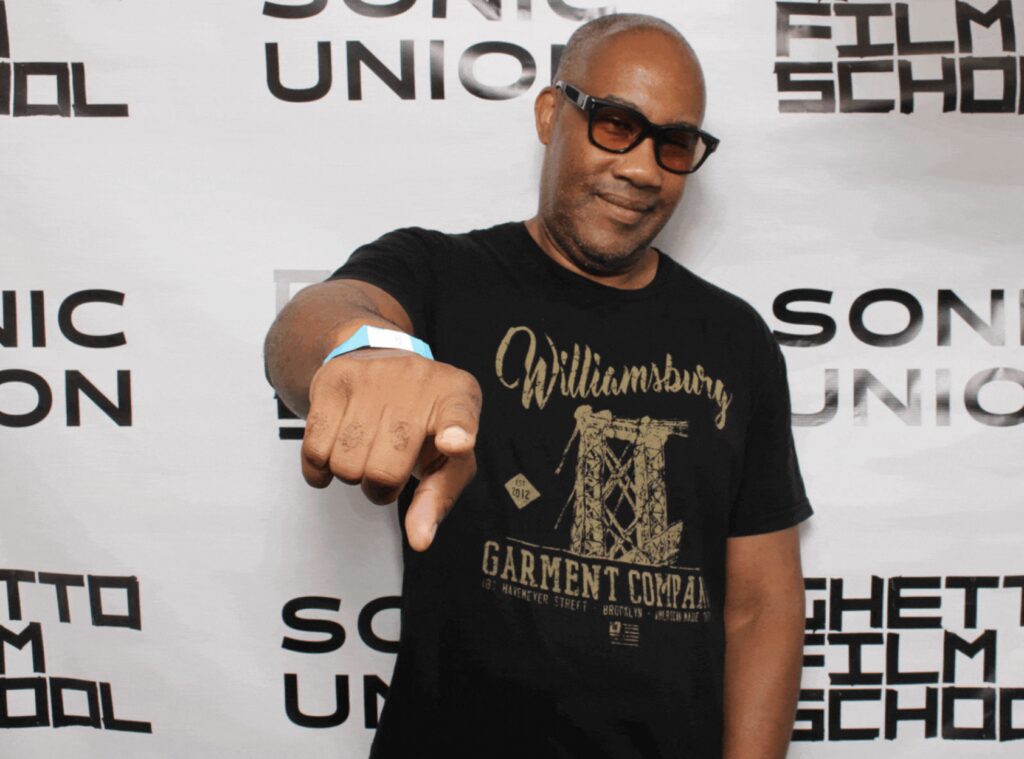
The Ghetto Film School, a nonprofit organization dedicated to nurturing the next generation of storytellers, recently hosted its highly anticipated End of Summer event. This annual gathering showcases the remarkable films created by up-and-coming Director of Photography (DP) talent, offering a glimpse into the future of cinematic artistry. In this blog post, we will explore the essence of the Ghetto Film School and highlight some of the standout films featured in this year’s event. Founded in 2000 by Joe Hall and Sharese Bullock, the Ghetto Film School (GFS) has built a brand dedicated to becoming a beacon of hope for aspiring filmmakers from underserved communities. GFS offers free education and mentorship programs designed to empower young creatives, providing them with the skills and opportunities needed to succeed in the world of film and media. They share our mission to level the playing field in the film industry with free or low cost mentoring and instruction. Our goal is to help aspiring filmmakers master Digital Storytelling using inexpensive tools like smartphones that are available to them. The Ghetto Film School End of Summer event serves as a celebration of the incredible talent nurtured within the GFS community. While GFS’s programs encompass various aspects of filmmaking, this particular event shines a spotlight on the Director of Photography, the visionary responsible for crafting the visual narrative of a film. Marc Esannason, from Making A Brand, had a chance to talk to David Mansour who produced a stunning short film called Cerulean Dream. “Cerulean Dream” is an avant-garde dance film that delves into the intricacies of pain and enlightenment, all conveyed through the art of acceptance in motion. This mesmerizing film was filmed in the vibrant backdrop of Brooklyn, New York, approximately two years ago. Crafted collaboratively by a passionate team of creatives, “Cerulean Dream” is a cinematic embodiment of our shared narrative of embracing acceptance – DAVID MANSOUR – CERULEAN DREAM. David said “he learned choreography in order to use his gimbal to keep up with the dancers as they danced in sync. The Ghetto Film School’s End of Summer event is more than just a showcase of emerging DP talents; it’s a celebration of the power of digital storytelling. As these young filmmakers continue to hone their craft, they are poised to make significant contributions to the world of cinema. With organizations like GFS providing guidance and support, the future of filmmaking is indeed bright, filled with fresh voices and innovative perspectives. As we eagerly anticipate next year’s events, we can only imagine the cinematic wonders that lie ahead for these talented DPs.
Essence Fashion House: We’ve Been Here Before
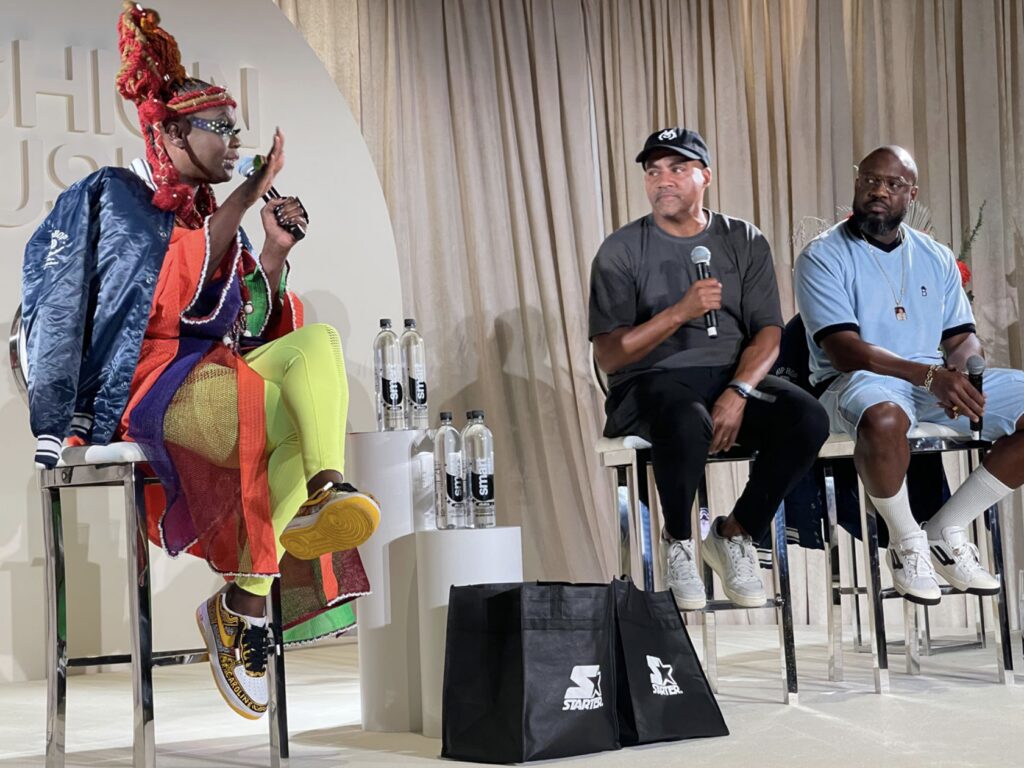
Essence Fashion House: We’ve Been Here Before’ Event with Caroline Wanga – President & Chief Executive Officer and Essence Ventures interviews Tony Shellman founder of Mecca USA and Enyce Clothing, and Michael Barnett (Mike B!) CEO of BOGARD by Mike B! In an electrifying celebration for fashion during Fashion Week in New York City, Essence Fashion House brought together a dynamic lineup of visionaries and fashion legends for their groundbreaking event, “We’ve Been Here Before.” This unforgettable gathering featured Caroline Wanga, President and Chief Executive Officer of Essence Communications, along with special guests Tony Shellman, co-founder of Mecca USA and Enyce Clothing Co., and Michael Barnett (Mike B!) from BOGARD, commonly known as Mike B! The event was not only a showcase of fashion and creativity but also a powerful reminder of how Black culture drives culture and IS culture, “…the revolution has to be financed and economic inclusion is a human right…” is how Caroline eloquently put it. Fashion has always played a pivotal role in the expression of culture, and this event celebrated fashion’s unique ability to tell stories, convey identity, and empower individuals. Caroline Wanga, the CEO of Essence Media, highlighted how the fashion we see today has been here before, how do we own it and operate today at our full value and have it returned to us. It was a celebration of being Black. Special Guest Tony Shellman, a fashion industry icon and founder of brands like Mecca USA and Enyce, joined the conversation to share his insights into his hisotry in fashion and Black culture. Tony spoke about his journey from the streets of Seatlle Washington to the streets of New York City and how he used Hip Hop as a backdrop to create his iconic styles of clothing at the companies he co-founded. Michael Barnett, a well known as Mike B! Your favorite fashion stylist, added his story to the conversation on how he started in fashion since day one. Mike B! reminisced about dressing up for Easter Sunday’s and using mom’s sheets as backdrops to take fun fashion styled photos as a kid. He eventually became the goto person for the street hustlers in his neighborhood to bring back the flyest wears for them to buy. This led to him graduating to become an intern stylist for Groovey Lou who was the main stylist for Sean Combs – Diddy at Bad Boy records. Today Mike B! Is the favorite fashion stylist for many top celebrities. One of the crucial takeaways from “We’ve Been Here Before” is the recognition that supporting the revolution is not only about protests and activism—it’s also about financial empowerment. To sustain and amplify the movement for Black culture and equality, it’s essential to invest in Black-owned businesses, creators, and artists, Wanga notes. It was an important showcase Afro-American brands for the next generations to watch. In closing Caroline expresses the importance for the younger creators to tap into the legends for guidance and know how. Never think you are too cool for school. Watch the full video our YouTube channel and don’t forget to subscribe to our channel for upcoming showcases and Making A Brand Creative Webinar series in the future.
Kai Cenat’s Union Square Episode: A Study in Brand Management and Media Perception
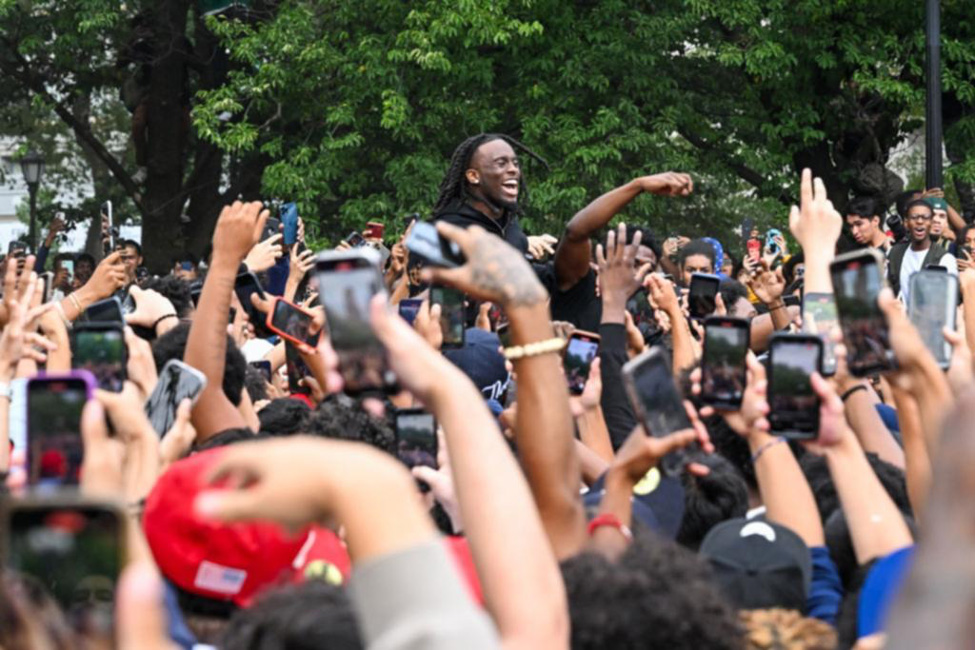
It was a regular summer day on August 4th when Kai Cenat, a social media powerhouse with over six million loyalists on Twitch and an impressive YouTube subscriber count of four million, decided to surprise his fans. His plan was simple: head to Union Square, New York City, and say he was going to generously distribute Sony PlayStations and various electronic devices. Little did he know that this simple act of generosity would morph into a media frenzy. As thousands of eager young enthusiasts thronged Union Square, the atmosphere thickened. Amidst the euphoria, fireworks lit up, not in the sky, but within the crowd. The thrill quickly devolved into chaos. A scene that was meant to be one of celebration and goodwill shifted to an uncontrollable riot. The result? 66 arrests – the majority being minors, and Kai Cenat found himself in the eye of a storm, slapped with accusations of inciting a riot and related charges. Protect Your Personal Brand: Always Stay Ahead of the Narrative The media, as we know it, swung into action quickly. The incident was not just local news anymore; it reverberated across national channels, drawing widespread attention. But in this coverage, one underlying narrative became glaringly evident. There’s a discomforting reality to face: A 21-year-old African American male, gathering thousands of his contemporaries, inevitably pushes certain societal buttons. The skepticism, alarm, and watchfulness that such assemblies receive, especially from governmental and local law enforcement units, speak of a deeper issue. An issue that begs the question of racial bias and societal double standards. Comparatively, history has shown us varying reactions to crowd incitements. Take the controversial episode where former president Donald Trump reportedly nudged his followers to assert dominance over the Capital, stunting the wheels of democracy. He remains untouched by the charge of inciting a riot, using a “free speech” defense, thereby casting a shadow over the alleged fairness of our system. It’s a tactic that does not always work. Especially for people who do not have the money to mount long, expensive legal battles. In the days that followed the Union Square incident, the pressure on Kai to explain his side mounted. And he did. Opting to use Twitch – a platform he doesn’t technically “own” – he broke his silence, condemning the unrest. But here’s the catch: Kai acted independently, without using a spokesperson, a PR expert, or a publicist. This is counter to, Branding 101 advice: Always stay ahead of the narrative. When the media senses an opportunity, they are relentless. The story can easily be twisted, painting you in hues far removed from reality. A publicist or PR firm isn’t just about managing an image; they are about damage control, disseminating your truth, and ensuring your voice isn’t lost in the cacophony of sensationalism. They liaise with media outlets, they craft the narrative, and most importantly, they shield you from direct onslaughts. However, a singular incident, no matter how magnified, cannot define a brand – especially one as established as Kai’s. While this episode might have been a jolt, it’s also a learning curve. It underscores the influence and reach Kai commands. His voice isn’t just a voice; it’s a power, an asset, something that holds tangible value. It’s unclear if Kai has a team providing advice on how to manage his brand but hopefully, they learn from this incident. Recognizing this the value of a positive brand image is vital. It’s the cornerstone of a brand’s DNA. In today’s digital age, where platforms are quick to capitalize on popular content, creators like Kai must be wary. Handing over intellectual property and using negative publicity tactics can often mean surrendering your value, allowing competing platforms to monetize and reap colossal profits at your brand’s expense. The antidote? Building a robust team, seasoned in personal branding AND damage control, with a keen understanding of preserving and enhancing a brand’s essence. Alternatively, you should find advisers who can act as mentors to help you until you have the means and are able to build a team. How To Build a Streaming Influencer Brand YouTube and Twitch have revolutionized the way influencers build a following and monetize their content. Both platforms offer unique opportunities for content creators to connect with audiences and generate income. YouTube influencers typically start by creating engaging and high-quality videos on topics they are passionate about, whether it’s gaming, beauty, tech, cooking, or any other niche. Consistency is key, as uploading regular content helps maintain audience interest and attract new subscribers. Collaborations with other creators and leveraging trending topics can also help boost visibility. To make money on YouTube, influencers have several options. The YouTube Partner Program allows creators to earn revenue through ads displayed on their videos. Additionally, they can engage in brand partnerships, where companies pay for sponsored content or product placements. Merchandise sales, channel memberships, and fan donations through features like Super Chat further contribute to their earnings. On the other hand, Twitch influencers focus on live streaming, providing real-time interaction with their audiences. They often excel in gaming, but other niches like art, music, and even “Just Chatting” have gained popularity. Consistent streaming schedules and engaging with viewers in the chat are crucial for building a loyal following. Interactivity sets Twitch apart, allowing creators to directly interact with fans and create a sense of community. Twitch streamers generate income primarily through subscriber revenue and donations from viewers using features like Bits and subscriptions. Ad revenue and brand partnerships also play a role. Twitch’s affiliate and partner programs offer creators additional ways to earn, while the platform’s emphasis on direct support from fans through tips and virtual items fosters a strong sense of fan engagement. In both cases, building a following requires dedication, authenticity, and engaging content. Success often comes from finding a unique voice, establishing a personal brand, and adapting to changes in audience preferences and platform algorithms. The combination of content creation, community engagement, and diverse monetization strategies allows YouTube and Twitch
A Team-Building Guide: Tony Shellman’s Secret to Success
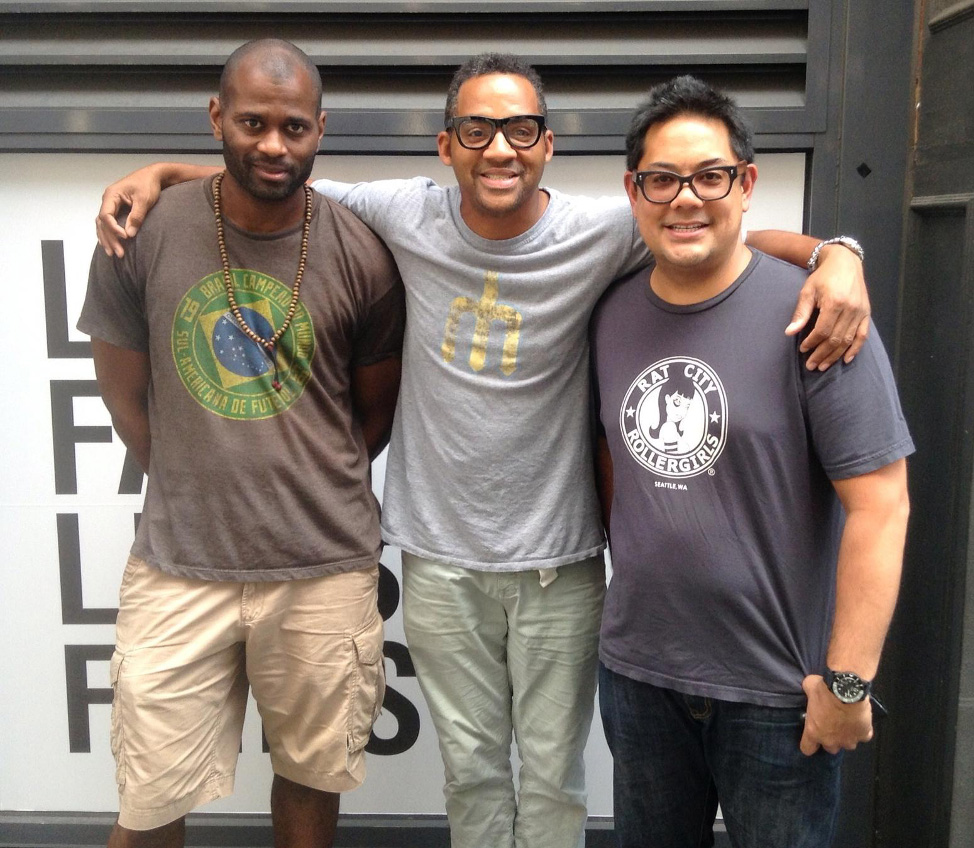
Behind every successful entrepreneur lies a team of talented individuals who contribute their unique skills and expertise to bring a vision to life. Tony Shellman, a prominent figure in the streetwear industry, has demonstrated this truth through his remarkable achievements in building not one, but three successful streetwear brands. Those brands consisted of Mecca USA, Enyce Clothing Company, and Parish Nation. A key aspect of Tony’s secret to success has been his ability to use a team-building guide to work with a highly qualified team, including his partners and close friends: Lando Felix, Phil Pabon, Chaka Wilson, and business partner Evan Davis. Together, they formed an unstoppable force that propelled their streetwear brands to new heights. One of the indispensable members of Tony Shellman’s team was Lando Felix. Lando was the co-founder of Mecca USA and Enyce Clothing Co. He is a creative visionary who brought a unique perspective to the table. Lando’s artistic talents and ability to forecast emerging trends helped shape the aesthetic direction of their streetwear lines. From designing eye-catching graphics to curating captivating campaigns, Lando infused each collection with his artistic flair. His ability to tap into the pulse of popular culture and translate it into compelling designs contributed to the brands’ appeal among streetwear enthusiasts. No successful venture can thrive without a keen business acumen, and Evan Davis provided precisely that for Tony Shellman’s streetwear lines. Evan’s strategic thinking, financial expertise, and strong analytical skills ensured that the brands not only looked good but also ran efficiently and profitably. He played a pivotal role in forging partnerships, negotiating deals, and managing the operational aspects of the business. Evan’s ability to balance creativity with a business mindset created a solid foundation for the brands’ success. He implemented robust systems and processes, sourced reliable manufacturing partners, and optimized the supply chain, enabling the brands to meet the demands of a rapidly growing customer base. und the brands was instrumental in their rapid growth and recognition. As his presence will always be missed, Phil Pabon served as the marketing strategist for Mecca USA and Enyce Clothing Company, translated creative concepts into actionable marketing plans. Phil’s deep understanding of the target market, consumer behavior, and industry trends allowed him to develop effective marketing strategies that resonated with the audience. He conducted thorough market research, analyzed data, and identified key opportunities to position the streetwear brands for success. Phil collaborated closely with Lando Felix, the creative visionary, to ensure that the marketing efforts aligned with the brand’s aesthetic and message. He oversaw the development and execution of cohesive marketing campaigns across various channels, including the ever growing market of the hip hop culturen, media, print, and product placement. Phil’s strategic approach helped build brand awareness, expand the customer base, and generate buzz around the collections. Chaka Wilson joined forces with Tony Shellman after Phil’s departure taking his marketing expertise to another level. With Mecca and Enyce already capturing a national market, Chaka saw an audience that wasn’t being marketed to. Chaka brought streetwear to the international market. Chaka leveraged his network of the music industry and tastemakers to create strategic partnerships and collaborations overseas. By identifying the right music artist and movie actors who aligned with the brand’s values, he amplified the reach and impact of the brand’s marketing campaigns. Chaka’s ability to forge meaningful connections within the industry played a significant role in elevating the brands’ visibility and credibility on an International level. Chaka, the marketing warrior that he is, conquered and dominated the European market by storm, increasing clothing sales for Enyce and Parish Nation tremendously. Other brands copied Chaka’s marketing strategy to tap into a market he had already established. The magic of Tony Shellman’s success lies not only in the individual talents of his partners but also in their ability to collaborate and harness the power of their collective skills. Together, they formed a dynamic team that seamlessly integrated their respective expertise to create a harmonious whole. By leveraging their individual strengths and fostering a culture of openness. Tony Shellman’s journey to building three successful streetwear lines serves as a testament to the power of a qualified and collaborative team. Lando Felix, Phil Pabon, Evan Davis, and Chaka Wilson each brought their dynamic talents to the table, propelling the brands to new heights. Through their combined efforts, they demonstrated that a successful venture requires a diverse range of skills and expertise. Their shared vision, dedication, and ability to work together harmoniously served as the foundation for their achievements. Aspiring entrepreneurs can draw inspiration from Tony Shellman’s team-building guide to recognize the importance of building a qualified team to transform their visions into reality. Discover Tony Shellman’s recipe for success at The Cultivators, where you can explore subjects like product development, intro to trademark basics, brand development, and other invaluable insights to set your business apart from your competition. Arrange a personalized meeting with Tony Shellman and our team of mentors through “Making A Brand – Talk to a Mentor” to engage in one-on-one discussions.
